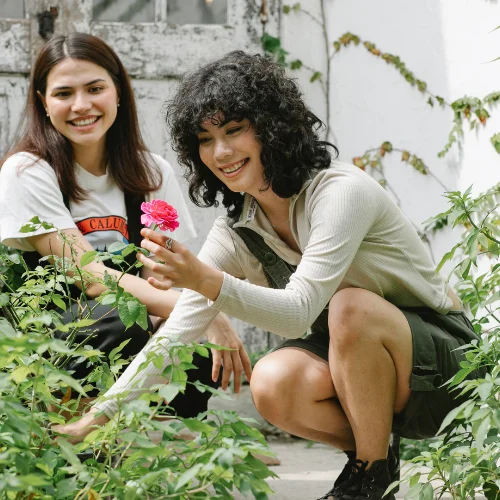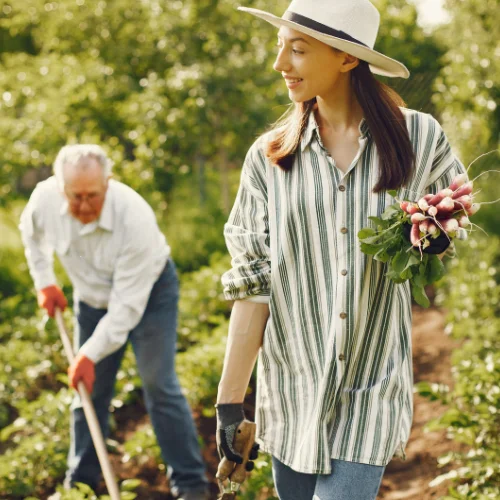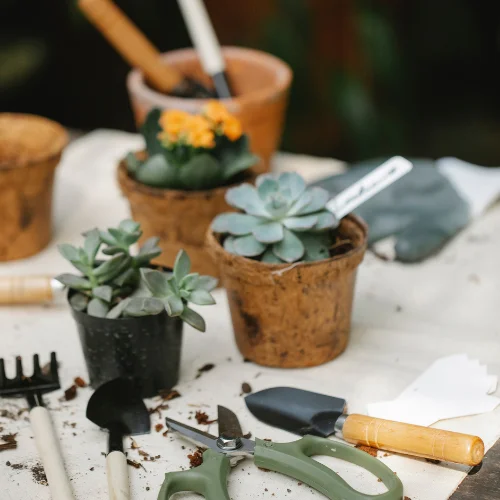How to Start a Garden Club for Seniors
Do you ever find yourself gazing at a beautiful garden and wondering how you can create something similar? Or maybe you have a green thumb and want to share your passion with others.
Starting a garden club for seniors is a fantastic way to bring together like-minded individuals who love gardening, want to connect with nature, and enjoy the company of fellow plant enthusiasts. In this blog post, I will share with you the steps to get your garden club up and running, ensuring a blooming success for everyone involved. So, let’s dig in!
Getting Started

Starting any club requires careful planning and organization. When it comes to a garden club for seniors, here are a few essential steps to begin with:
Define the Purpose
Determine the primary objective of your garden club. Is it about learning new gardening techniques, creating a beautiful community garden, or simply enjoying the therapeutic benefits of gardening together? By clarifying the purpose, you can better attract like-minded seniors who resonate with your goals.
Assemble a Core Team
Enlist a small group of dedicated individuals who share your enthusiasm for gardening and organizing events. This team will help with decision-making, logistics, and spreading the word about your club.
Choose a Name and Location
Select a catchy name that reflects the spirit of your garden club. Next, find a suitable location for your meetings, workshops, and gardening activities. Consider partnering with local senior centers, community centers, or even private gardens.
Spreading the Word

Now that you’ve got the groundwork laid, it’s time to let the world know about your garden club and attract interested seniors. Here are some effective ways to spread the word:
Promote Locally
Put up posters or flyers in community centers, libraries, coffee shops, and other popular gathering spots for seniors. Use eye-catching designs and clearly mention the benefits of joining your garden club.
Utilize Online Platforms
Leverage the power of social media and create a Facebook page or an Instagram account dedicated to your garden club. Share captivating photos, gardening tips, and upcoming events to engage with potential members.
Engage Local Media
Reach out to local newspapers, radio stations, or community newsletters to feature your garden club’s launch and ongoing activities. It’s a great way to attract attention and inspire more seniors to join.
Nurturing the Garden Club

As your garden club starts to bloom, it’s crucial to provide meaningful activities and opportunities for your members to learn, connect, and grow. Here’s how you can nurture your garden club:
Arrange Workshops and Demonstrations
Invite gardening experts, horticulturists, or master gardeners to conduct workshops and demonstrations. Topics can range from plant propagation and container gardening to creating a butterfly-friendly garden. Such events will help members enhance their gardening skills and foster a sense of community.
Organize Garden Tours and Field Trips
Plan visits to botanical gardens, nurseries, or other members’ gardens to inspire creativity and share ideas. Exploring different garden styles and plant varieties can broaden everyone’s horizons.
Foster Knowledge Exchange
Encourage members to share their gardening experiences, tips, and success stories during regular meetings. This creates a supportive and inclusive environment where everyone can learn from each other’s expertise.
Community Engagement

A garden club isn’t just about gardening; it’s also an opportunity to give back to the community and make a positive impact. Here’s how you can engage with the broader community:
Initiate Community Gardening Projects
Collaborate with local schools, community centers, or parks to create and maintain community gardens. This collaborative effort will not only beautify public spaces but also promote intergenerational connections.
Host Plant Swaps and Sales
Organize plant swaps or sales where members can exchange or sell their surplus plants, seeds, or gardening supplies. This encourages sustainable gardening practices and enables members to expand their plant collections.
Participate in Local Events
Take part in gardening expos, farmers’ markets, or community fairs to showcase your garden club’s achievements and attract new members. It’s an excellent opportunity to connect with other gardening enthusiasts in your area.
Creating a Welcoming Environment

To ensure the success and longevity of your garden club for seniors, it’s essential to create a warm and welcoming environment. Here are some tips to make everyone feel at home:
Foster Friendships
Encourage members to interact and get to know each other by organizing social activities alongside gardening events. Plan potluck lunches, tea parties, or even a gardening-themed book club. Building friendships will enhance the sense of community within the club.
Provide Support for Beginners
Not everyone joining your garden club will have extensive gardening experience. Create a mentorship program where seasoned gardeners can guide and support newcomers. This mentorship will empower beginners to learn and grow their gardening skills with confidence.
Embracing Technology
In today’s digital age, incorporating technology into your garden club can enhance communication and accessibility. Here are some ways to embrace technology:
Create a Club Website
Develop a simple website where you can share club information, upcoming events, gardening resources, and even member profiles. This serves as a hub for all club-related activities.
Online Learning Resources
Curate a list of reputable gardening websites, YouTube channels, or online courses that members can explore to further their gardening knowledge. Sharing these resources will encourage continuous learning.
Seasonal Gardening Tips

Gardening is highly seasonal, and providing specific tips for each season will keep your club engaged year-round. Here are some seasonal gardening tips to share with your members:
Spring
Encourage members to start seeds indoors, prepare garden beds, and focus on spring-flowering bulbs and early-season vegetables.
Summer
Discuss strategies for watering, pest control, and maximizing yield during the warmer months. Encourage members to share their favorite summer gardening hacks and recipes.
Fall
Provide guidance on fall cleanup, planting bulbs for spring, and transitioning the garden for winter. Discuss the benefits of cool-season crops and offer advice on preserving the harvest.
Winter
Explore indoor gardening options, such as growing herbs or succulents, and discuss winter plant care and maintenance. Share tips for creating festive winter arrangements.
Celebrating Achievements
Recognizing and celebrating the achievements of your garden club members will boost morale and strengthen the bond among participants. Here are some ways to celebrate:
Garden Show and Tell
Set up a monthly or quarterly garden show and tell session, where members can showcase their garden successes, share challenges, and seek advice from fellow gardeners.
Annual Awards Ceremony
Organize an annual awards ceremony to acknowledge outstanding contributions, such as the best flower arrangement, the most innovative gardening idea, or the most improved gardener. This adds a touch of excitement and friendly competition to the club.
What does the research say about gardening for older adults?
In this study, researchers wanted to find out how gardening affects the well-being of older adults. They looked at both people who garden in their own homes and those who are part of gardening groups in their community.
They asked 331 older adults in Australia about different things like their age, gardening interests, what they do in their gardens, what they get out of it, how they feel about their health and quality of life, and how they feel about getting older.
Here’s what they found:
Gardening Makes Older Adults Feel Good: The older adults who took part in this study reported feeling better about themselves and their lives when they did gardening. It made them feel more positive about aging.
Physical and Mental Benefits: Gardening helped them physically and mentally. It gave them a sense of accomplishment and happiness. For example, when they grew vegetables, flowers, fruit, or herbs, it made them feel proud and satisfied.
Social Connection: People who were part of gardening groups not only enjoyed gardening but also felt more connected to others. They had more social interaction and physical activity.
Nature is the Key: Being close to nature in their gardens was important. Even just being in the garden without necessarily working on it had a positive impact on their well-being.
Gardening is Meaningful: Older adults found meaning in gardening. It gave them a sense of achievement, creativity, and appreciation for nature. Their gardens were like a part of themselves, and they took pride in them.
Gardening Helps Maintain Identity: For many older adults, gardening was a big part of who they were. It contributed to their overall happiness and satisfaction with life. Losing the ability to garden due to illness or other reasons could have a negative impact on their sense of self.
Gardens in Aged-Care Facilities: The study suggests that it’s a good idea to have gardens in places where older adults live, like retirement homes or care facilities. Gardens can provide a sense of renewal and well-being for older adults, especially when they face health issues or the loss of a loved one.
In simple terms, gardening is not just about growing plants; it’s a fantastic way for older adults to feel better about themselves, stay active, make friends, and connect with nature. It brings happiness and a sense of accomplishment, which is important for their overall well-being as they age.
So, if you’re getting older, don’t hesitate to pick up a shovel and start gardening—it can do wonders for you! And if you’re planning facilities for older adults, consider adding gardens to make their lives happier and more fulfilling.
Conclusion
Starting a garden club for seniors can be a rewarding experience, fostering a sense of community, providing opportunities for learning and sharing, and nurturing a love for nature. By following the steps outlined above, you can lay a solid foundation for your garden club’s success.
So, what are you waiting for? Grab your gardening gloves, gather fellow green thumbs, and embark on this wonderful journey of growing together! Share your thoughts, experiences, or questions in the comments section below, and let’s connect over our shared love for gardening.

